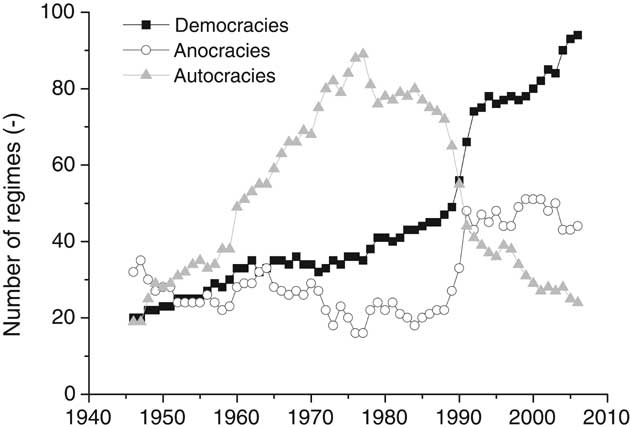With increased trade liberalization, developing countries would need science based regulatory frameworks for sanitary and phytosanitary issues and institutional market infrastructures to strengthen market information systems, including grades and standards. Human and organizational capacity to effectively implement the international standards will also need to be developed
.
The projected decrease in FDI would create a need for more domestic investment in agriculture. Developing country decision makers will need tools to help in agricultural strategic planning and budget prioritization.
4.3.3 Sociopolitical drivers of alternative futures in agriculture and AKST
4.3.3.1 Types of sociopolitical drivers
The direct and the indirect drivers of AKST (Figure 4-1) are influenced by public policies, which are the outcome of political processes. Therefore, the sociopolitical factors that influence public policy making and the implementation of public policies are important drivers of alternative futures in AKST. These factors include (1) the political system (type of political regime, political culture, ideology, political stability); (2) public administration and its effectiveness in policy implementation; (3) the structure of society (social stratification, social values, ethnicity; social conflicts); and (4) extent of regional and global collaboration. For an assessment of alternative scenarios for the future of agriculture and AKST, it is necessary to assess major trends of change in political and administrative systems and in society, and to evaluate how these changes will influence the choice of public policies and sociopolitical events. For obvious reasons, the possibilities to project sociopolitical change are more limited than the possibilities to project trends in other drivers such as, for example, demography.
4.3.3.2 Change in political systems and public policy choices
Major political trends after World War II were an increase in authoritarian regimes (autocracies) until the early 1970s, followed by a rapid decline (see Figure 4-8). Accordingly, the number of democracies has increased rapidly since the early 1970s. The number of "anocratic" states, intermediate states where elites maintain power despite the existence of democratic procedures, has increased, too. A conventional thought is that these trends continue into the future (this underlies a large number of long-term scenarios including, for instance, most reference scenarios—but also 3 out of 4 scenarios in the Millennium Ecosystem assessment (Global Orchestration, Technogarden and Adapting Mosaic)). There has also been a trend towards increasing citizen participation in the formulation of development strategies. Sectoral policy documents such as agricultural sector strategies are increasingly developed with broad stakeholder consultation. Another important trend in political systems throughout the developing world is democratic decentralization, i.e., the transfer of political authority to lower levels of government.
How do these trends of democratization, decentralization and participatory policy making influence the choice of public policies? The relationship between democracy and economic development is complex (Bardhan, 1999), but

Figure 4-8. Global regimes by type (1946-2006). Source: Based on Marshal, 2006.
changes in political systems that allow citizens to participate more broadly in political decision making will reduce "urban bias" (Lipton, 1977) and increase the attention given to agriculture, because this sector employs a large part of the population in developing countries. However, there is no empirical evidence of such an effect (see Fan and Rao, 2003). In democratic political regimes, agricultural interest groups are often able to exercise political pressure to obtain subsidies and protection, which typically benefit larger-scale more than small-scale farmers, whereas it is more challenging to create political pressure for investments in public goods, such as agricultural research (cf. Lopez, 2005). The influence of political regime type on other agricultural policies, such as access to land, agroenvironmental policies, and regulation against unfair competition, is not straightforward.
While the evidence on the link between political regime type and general agricultural policies is inconclusive, evidence suggests that democratization will lead to a stronger focus on food security. None of the great famines occurred in a democracy (Sen, 1981). Moreover, famines can be avoided by fairly elementary government actions, because they are rarely caused by absolute shortages in food supply (Sen, 1981). Subsequent work showed that the freedom of press does, in fact, play an important role in avoiding food crises and famines (cf. Sen and Drèze, 1989). In this light, an increase in number of democracies appears to imply that increased accountability would lead to less food crises.
For authoritarian regimes, political ideology, development orientation and the time horizon of the regime influence the commitment to agriculture and the choice of agricultural policies. Indonesia (under Suharto) and China are examples of authoritarian regimes that invested heavily in agriculture and rural development, though with limited recognition of the need for environmental sustainability. In Africa, there is evidence that military leadership has had a negative influence on public spending for agriculture (Pala-niswamy and Birner, 2006). The trend towards democratization and citizen participation in policy making, which is projected to continue, has ambiguous implications with regard to alternative future scenarios for agricultural and